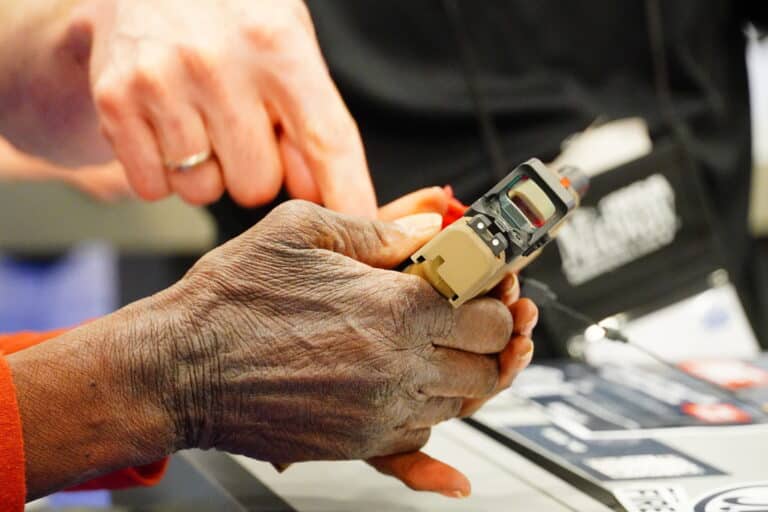Gun policy has played a fairly limited role in the 2024 election compared to years past. Voters may have largely tuned out.
A new poll from The Economist/YouGov last week identified a modest uptick in support for certain gun-control measures in the aftermath of the Apalachee High School shooting in Winder, Georgia. Despite a horrific mass shooting clearly being fresh on the minds of respondents to the survey (90 percent said they were familiar with the incident), they nonetheless listed guns as a bottom-tier issue. Only four percent said it was their most important issue, placing it squarely in the bottom third of the options listed.
That finding continues a recent trend. A Fox News poll last month showed that the issue is far from top-of-mind for most voters. Just three percent of respondents said guns would be the most important issue in deciding their vote for President, the least cited issue polled. An NBC News poll released earlier this month of Gen Z voters, who have sometimes prioritized gun laws more than other generations, also found that gun policy ranks dead last among issues that matter most to their vote.
Now, it is true that guns have rarely been the top issue on voters’ minds in most elections. “It’s the economy, stupid,” became a political cliché for a reason, as voters have consistently placed kitchen table issues like employment, inflation, and economic opportunity above most others. Yet, it was not that long ago that guns were also given considerable weight by American voters, including in the last federal election season.
An August 2022 AP-NORC poll found “gun violence” trailed only inflation as the issue Americans viewed as the biggest problem heading into the midterm election that year. Similarly, an August 2022 Pew survey analyzing midterm election issues found 62 percent of voters then said that “gun policy” was very important to their vote that year—second only to the economy in a list of options that included perennial hot-button subjects like immigration, abortion, violent crime, health care, and more. Even as recently as last spring, a Fox News survey of registered voters found that “gun control/violence” was the third most commonly cited issue ranked in terms of importance behind the economy and inflation.
There has been a noticeable lack of attention to guns in the 2024 election cycle. The issue never came up during the GOP primary, even as Former President Donald Trump was vulnerable on the issue from the right. After securing the nomination, the Trump team removed nearly all mentions of guns and gun policy from the Republican party platform. He also didn’t talk about gun rights issues at all during his acceptance speech at the RNC, nor did the convention feature any gun rights speakers as it had in years past.
It also wasn’t brought up in the debate between Trump and President Joe Biden.
The debate between Trump and Vice President Kamala Harris, held shortly after the Georgia school shooting, had guns come up but not directly. Gun policy wasn’t given its own dedicated question by the ABC News debate moderators. Instead, it was relegated to a brief exchange between the candidates in an aside over Harris’ past position on mandatory AR-15 buybacks.
That may be because the GOP is currently de-prioritizing guns alongside other social issues, like abortion and gay marriage. But it might just be that the lack of emphasis on guns is coming from the bottom up.
The 2022 election is illustrative for potentially explaining voters’ attention shift.
The midterms came on the heels of one of the most tumultuous and eventful periods for guns and American society in recent history. The years that immediately preceded had simultaneously seen a record-setting stretch of gun sales among Americans overall, as well as to first-time gun buyers. Murder rates had just spiked to levels not seen in this country in decades. Incidences of horrific mass gun violence, including the murder of 19 children at an elementary school in Uvalde, gripped the nation. The President signed the first new federal gun-control law in nearly 30 years. The Supreme Court handed down a landmark Second Amendment decision recognizing a right to carry firearms in public for self-defense. The House of Representatives passed an “assault weapon” ban for the first time since 1994.
By contrast, 2024 has been almost historically quiet on that front.
Murder appears to be on a rapid decline for the second year in a row. Gun sales, while still slightly elevated above pre-pandemic levels, are nowhere near where they were between 2020-2022. Divided control of Congress has ensured no further legislative advancements of any new gun restrictions. The group most likely to raise the salience of guns in past election cycles, the NRA, has found itself severely diminished after an adverse ruling in its corruption case. And until last week in Georgia, there had not been a single mass shooting that meets the Violence Project’s definition of four or more people killed in a random public attack—precisely the sort of incidents that have tended to put guns back in the national conversation.
So it perhaps shouldn’t be much of a surprise that guns have played a less prominent role this election season than in years past.






